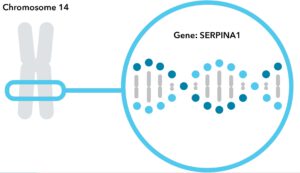By Amanda McCorquodale
When I ordered my 23andMe kit, I thought genetic health information was simply another version of family health history gathered by doctors at every wellness visit. ![]()
My Results Are In
Yet when the email arrived indicating that my results were ready, I was suddenly terrified to read them.
After all, learning that your body may have a hidden risk is tough to stomach. Heck, even James Watson, one of the scientists who discovered the double-helix structure of DNA, refused to find out whether he carried the genetic variant that would put him at a higher risk for late-onset Alzheimer’s disease.
Do I Want to Know?
23andMe makes sure to put certain health results —the report that looks at your potential risk for late-onset Alzheimer’s disease for instance — behind many locked doors, so to speak, giving users the option to open them or keep them closed if they wish. Even if you decide to open these locked reports, 23andMe requires you to go through a tutorial to ensure you understand the reports before you open them.

There is an additional opt-in process for viewing four of the Genetic Health Risk reports.
Genetics is not deterministic, and 23andMe doesn’t diagnose anything, I reminded myself. They are pretty clear that even if you have a genetic variant that puts you at a higher risk for certain conditions, it’s only one of many factors that could lead to developing the condition or disease. Often, the genetic test only identifies a small set of variants associated with the disease – so even if no variant is detected, you still may be at some genetic risk for the condition.
Information About Me
23andMe has more than a dozen different reports on Health Predispositions, including genetic health risk reports. You have to opt-into viewing those reports. There are also four of the reports — the Late-Onset Alzheimer’s Disease Genetic Health Risk report*, the genetic health risk report on Parkinson’s Disease,* the BRCA1/BRCA2 (Selected Variants) Genetic Health Risk report*, and the MUTYH-associated Polyposis Genetic Health Risk report* — that require an additional opt-in to unlock those results. Before doing that 23andMe has you review a tutorial, to ensure you carefully consider whether or not you actually want to see the results. After reviewing the tutorial, I decided to unlock those reports and face my genetic health information head-on.
I learned that I have three genetic variants that may influence my chances of developing certain health conditions. I have a slightly increased risk for age-related macular degeneration (AMD).* I was not surprised as I knew of relatives who had developed this late in life, but I was disappointed to learn I had inherited this genetic predisposition to vision loss.
The results put my genetic risk in perspective, however. There are things I can do to decrease the chances of developing AMD. I learned that making changes to my diet, and other lifestyle choices like not smoking play a major factor in my overall risk.
Mitigating Risks
My risk for developing AMD is also something I could pass onto my kids, but knowing about it now allows me and any of my family to make lifestyle changes that could help mitigate those risks over time.
My results also revealed that based on my genetics I have about a 35 percent chance of developing type 2 diabetes at some point in the next 40 years, which is considered a typical likelihood for someone of my ethnic background. Having developed gestational diabetes twice myself and knowing multiple family members with diabetes, I was surprised that my genetic likelihood wasn’t higher.
More surprising is that I carry one of the two genetic variants associated with alpha-1 antitrypsin deficiency, a genetic condition I had never heard of that can lead to lung and liver disease.* According to my results, having just one of the variants is not associated with an increased risk. Yet, I wondered if having one variant could impact my health at all, so I made a note to ask my physician at my upcoming physical.
Looking at these different reports, I learned that I can take simple actions to mitigate my chances of developing these conditions. Genetics is important but often a small part of my overall health.
The results also put my long-term wellness in focus, and I found I was that much more motivated to pursue healthy habits such as eating healthy, getting enough sleep and exercise regularly.
You can read the first post on this three-part series here.
Amanda McCorquodale is a freelance writer. Her work has appeared in Gourmet, Miami Magazine and Mental Floss. She previously worked as an associate editor at the Huffington Post and as an Arts and Culture Editor at the Miami New Times. She lives in New York with her family.
*The 23andMe PGS test includes health predisposition and carrier status reports. Health predisposition reports include both reports that meet US FDA requirements for genetic health risks and the 23andMe Type 2 Diabetes health predisposition report which is based on 23andMe research and has not been reviewed by the FDA. The test uses qualitative genotyping to detect select clinically relevant variants in the genomic DNA of adults from saliva for the purpose of reporting and interpreting genetic health risks and reporting carrier status. It is not intended to diagnose any disease. Your ethnicity may affect the relevance of each report and how your genetic health risk results are interpreted. Each genetic health risk report describes if a person has variants associated with a higher risk of developing a disease, but does not describe a person’s overall risk of developing the disease. The test is not intended to tell you anything about your current state of health, or to be used to make medical decisions, including whether or not you should take a medication, how much of a medication you should take, or determine any treatment. Our carrier status reports can be used to determine carrier status, but cannot determine if you have two copies of any genetic variant. These carrier reports are not intended to tell you anything about your risk for developing a disease in the future, the health of your fetus, or your newborn child’s risk of developing a particular disease later in life. For certain conditions, we provide a single report that includes information on both carrier status and genetic health risk. Warnings & Limitations: The 23andMe PGS Genetic Health Risk Report for BRCA1/BRCA2 (Selected Variants) is indicated for reporting of the 185delAG and 5382insC variants in the BRCA1 gene and the 6174delT variant in the BRCA2 gene. The report describes if a woman is at increased risk of developing breast and ovarian cancer and if a man is at increased risk of developing breast cancer or may be at increased risk of developing prostate cancer. The three variants included in this report are most common in people of Ashkenazi Jewish descent and do not represent the majority of BRCA1/BRCA2 variants in the general population. The MUTYH-Associated Polyposis Genetic Health Risk Report is indicated for reporting the Y179C and G396D variants in the MUTYH gene and an increased risk for colorectal cancer. The two variants included in this report are most common in people of Northern European descent. These reports do not include variants in other genes linked to hereditary cancers and the absence of variants included in these reports do not rule out the presence of other genetic variants that may impact cancer risk. The PGS test is not a substitute for visits to a healthcare professional for recommended screenings or appropriate follow-up. Results should be confirmed in a clinical setting before taking any medical action. For important information and limitations regarding other genetic health risk reports and carrier status reports, visit https://www.23andme.com/test-info.